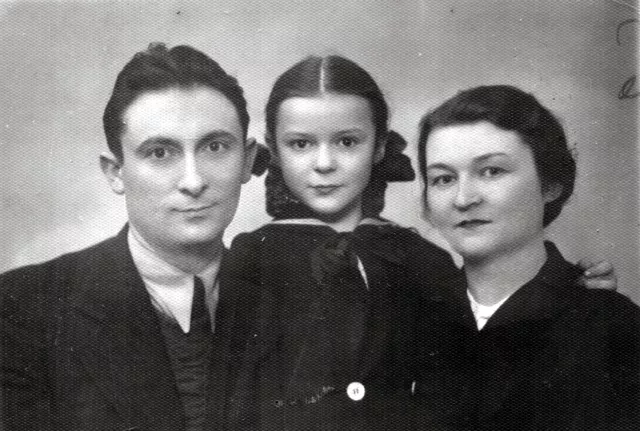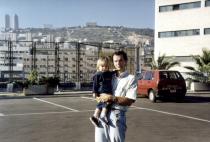Liana Degtiar with her parents Elih and Sophia Degtiar
This is me (in the center), with my parents Elih and Sophia Degtiar. This photo was taken in Bucharest in 1940.
I have vague memories of our apartment in Bucharest. My nanny and I stayed in the biggest room. There was a dining room with a radio and a big table in it. My parents rearranged the fore-room for a bedroom. They had one big double bed in it. My parents must have spoken Russian at home since I started talking in this language. My parents didn't observe Jewish traditions or celebrate Jewish holidays at home. Perhaps, my mother baked something on Purim or Chanukkah. My mother was a typist at the railroad office. My nanny was Polish I think. She was a devoted Catholic and took me to the Roman Catholic Church regularly. At first I listened to the priest when he pronounced his prayers. Once, I started singing myself, when everybody else was quiet. After that my nanny stopped taking me with her. Later she left us. My mother was desperate as she had to go to work and needed a baby sitter. She told me, as she was wondering what to do about the situation, she saw a young nice-looking girl walking towards her. My mother asked her, 'Where can I find a nanny?' And the girl replied, 'But I can work for you!'
This was how Mariora came into our family. Mariora was an illegitimate daughter of a beautiful gipsy woman and a Romanian landlord. She grew up in his mansion. She could read and write in Romanian, but this was all the education she had. When she came to our house, she was already married. Her husband was a private in the Romanian army. Mariora took care of me and took me out to walk in the park. I picked up some Romanian from her, but I never learned to read or write. I think my Romanian was more beautifully spoken than the Romanian they speak in Moldova nowadays. Mariora stayed with us even when I went to kindergarten. I think this was a private kindergarten. They didn't teach us to read or write, but we learned embroidery and other handicrafts: we made carton toys and decorated them with applications. Mariora was so attached to our family that when we were leaving Bucharest she wanted to go to Bessarabia with us, but it wasn't possible. I often thought about her after the war and still remember her.
My parents' friends and relatives often visited us in Bucharest. My father's younger sisters, Fenia and Riva, often visited us, and Gita and Yakov and their son Carl, who also lived in Bucharest, often came to see us also. Carl was two years older than me. We were friends. Gita told me that she once overheard our small talk. I asked Carl, 'What will you do when you grow up?' He thought a little and said, 'I will be a philosopher.' 'What do philosophers do?' I asked. 'I will be sitting and thinking.' Then I said, 'Ha! What would you eat then?' My father's sister Rachil and my cousin brother Yuzik and cousin sister Dina lived near Bucharest and often came to see us as well.












